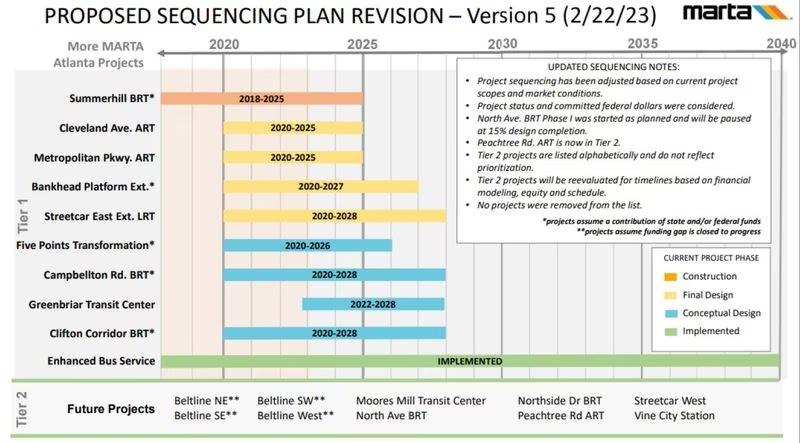For the first time since Atlanta voters approved a new half-penny sales tax to fund MARTA expansions in 2016, city leaders are calling for a formal review of the transit agency’s finances related to the More MARTA program that’s so far failed to deliver.
In response, the transit agency today called the Atlanta City Council’s decision a red herring and political theater, pointing to what MARTA calls a strong financial track record in recent years.
On Monday, the Atlanta City Council unanimously approved legislation calling for a complete financial audit of the More MARTA program, to be paid for and overseen by the city’s Department of Finance—and not internally by MARTA.
More than six years ago, Atlanta voters overwhelmingly approved a half-penny sales tax that was expected to net $2.7 billion for transit expansions and upgrades over the next four decades. MARTA has caught heat in recent weeks for drastically reducing the scope of expansion plans, blaming inflation and rising costs, while revealing that most of $395 million collected from More MARTA sales taxes so far has been channeled toward enhanced local bus services—instead of fresh transit options around the city. (A reader poll with nearly 900 responses on these pages suggested Atlantans are none too pleased with the revised shortlist.)
Now, the city council is asking that MARTA respond to its legislation on or before March 29, when the council’s Transportation Committee meets.
The audit’s scope would include all revenues and expenditures related to the More MARTA program and “local revenues and expenditures that support operations and capital projects in Atlanta,” according to a city-issued announcement, “as well as federal funds received and expended in the program’s lifetime to date, including federal COVID-19 relief funds.”
Councilmember Marci Collier Overstreet, the bill’s original sponsor, councilmember Amir Farokhi, the council’s Transportation Committee chair, and Doug Shipman, council president, hosted a press conference Tuesday morning to discuss the logic behind the audit legislation. (Both Farokhi and Shipman were cosponsors of the bill.) The council’s resolution has been sent to MARTA’s leadership as well as its Board of Directors, according to city officials.
“Placing this audit in the city’s hands guarantees that we can find an independent third party to review the numbers,” Overstreet said in a prepared statement. “This way we get the most objective assessment of the way More MARTA is going.”
Added Farokhi in a separate statement: “Atlanta residents took a leap of faith when they agreed to impose a tax on themselves in exchange for more transit inside the city. In particular, a regressive sales tax that hits some residents harder than others. MARTA needs to repay that faith by periodically opening up the books to the people so that they can see how their money is being spent.”
Shipman predicted the audit “will not be overly burdensome” and will function “to repair trust between MARTA and the City of Atlanta, but more importantly, between MARTA and the Atlanta taxpayers.”
In its formal response to Atlanta media, it was clear MARTA didn’t take kindly to the legislative action.
MARTA officials called the city council’s position “disappointing and disingenuous” in that “[MARTA has already] answered these questions, and instead of accepting the answers, [the council] is playing politics by demanding a full performance review of decisions made by previous MARTA and City of Atlanta leaders.”
MARTA officials, in a statement supplied to Urbanize Atlanta, went on to call the proposed audit a political roadblock that will delay work on the transit agency’s key projects moving forward, adding: “This is yet another stall tactic from a collective group that has been wringing their hands and conflating the More MARTA program with the City’s Renew Atlanta TSPLOST program,” which is promising $750 million in upgrades to roads, parks, trails, and pedestrian infrastructure.
MARTA says the audit will force the agency to pause work on the remaining More MARTA projects until it's resolved—with the exception of federally funded Summerhill bus-rapid transit installation and the planned transformation of downtown’s Five Points station.
MARTA officials maintain they’ve been transparent and have freely shared financial and other reports with the council and on the agency’s website, including audits by outside parties that have found MARTA to have a perfect AAA credit rating. MARTA has continued service through eight mayors and hundreds of councilmembers since its founding in 1971, the agency noted.
“While at times, all relationships are challenging, MARTA is focused on providing service and expanding the system for those we serve,” MARTA’s statement reads. “The best thing the politicians on council can do for their constituents in the City of Atlanta is to get out of the way and let MARTA deliver the projects.”
...
Follow us on social media:
• MARTA-related news, discussion (Urbanize Atlanta)







